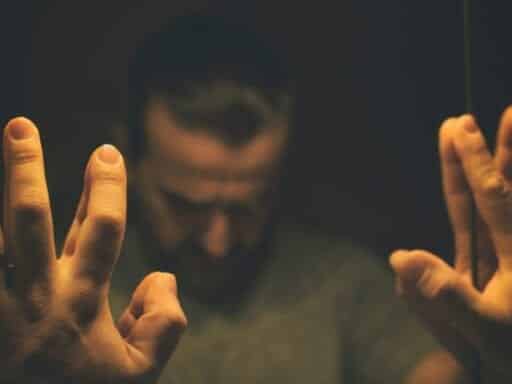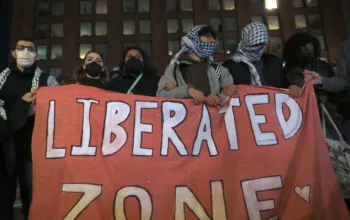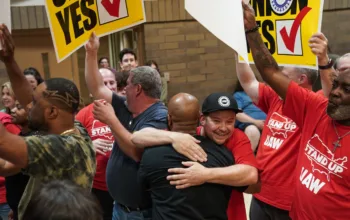
I thought incels were easy to demonize. Then I talked to an incel support group.
Warning: This article includes discussion of internet forums whose participants frequently talk about depression and self-harm.
In 2014, a 22-year-old man killed six people and wounded 14 in a mass shooting in Santa Barbara. Before the shooting, he left behind a series of videos and a “manifesto” in which he vowed his hatred for women and expressed deep bitterness over his status as a virgin. In April 2018, a 25-year-old man who carried out a Toronto terrorist assault directed at women praised the Santa Barbara shooter in a Facebook post shortly before his own attack, which left 10 dead and 14 wounded.
Both men identified as part of incel culture. Once hidden away within the internet’s dark underbelly, in recent years, incels have become a growing part of the conversation around toxic misogyny, the alt-right, and gendered violence. The Santa Barbara and Toronto attackers were heavily involved in and influenced by incel communities, where “involuntary celibates,” usually men, gather to opine on their inability to attain love and sexual fulfillment. This feeling of aggrieved entitlement — incels frequently feel entitled to the sexual and romantic interest of women, and bitterly resent women who reject them — is often characterized by a virulent, violent misogyny.
As awareness has grown around this troubled community and its outbursts of targeted misogynistic violence, so has speculation about what, if anything, can help its members. New York Times columnist Ross Douthat wrote a piece in May, “The Redistribution of Sex,” arguing that a “right to sex” — that is, the right to have some sort of sexual intercourse regardless of where you fit in a social hierarchy — will eventually become an established part of a liberal society. Douthat intended his piece to be a sort of balm, giving hope that one day technology and regulation would “address the unhappiness of incels, be they angry and dangerous or simply depressed and despairing.“
But if that’s what he was intending, he forgot to ask actual incels how they feel about having their unhappiness assuaged by the powers that be. The answer might have surprised him — and most people — because incel culture is inherently built around the rejection of the idea that one’s unhappiness can ever be remedied.
The incel community is notorious for rampant misogyny, violent rhetoric, and fatalistic attitudes toward modern relationships — attitudes that frequently serve as a gateway to the alt-right — but it’s also rife with depression, a nihilistic communal celebration of low self-esteem, and a widespread resistance to seeking therapy and getting treatment for mental illness. In fact, questions about how to meaningfully help men mired in incel culture before they become radicalized or violent reflect larger cultural questions about how we’re serving the mental health needs of all men in modern society.
To better understand how “self-help” works in a community that is obsessed with hopelessness, I spoke to five members of the incel community — including two women, for women surprisingly form an increasingly vocal part of the incel community, whether as incels themselves or allies who seek to create a community of support within a culture that often teaches its members that support is a hopeless pipe dream. While it was clear from these discussions that the nihilism of inceldom feeds its extremist toxicity and misogyny, I also found examples of members being kind and supportive of each other’s mental health, even as they wrote off their own chances for happiness.
This suggests that there may be a much more direct way to reach members of the incel community, and it’s simultaneously much simpler and much harder than anything Douthat proposed, with his brief mentions of sex robots and liberated sex workers. Outreach for incels shouldn’t start with enabling the community’s violent misogyny or its collective sense of entitlement to the bodies and emotional support of women. It should start with improving men’s access to mental health treatment — and, crucially, their faith that it can do them any good.
Taking the black pill, explained
Reddit’s main incel community, r/Incels, was permanently banned last year for “violent content” as part of a recalibrated commitment to moderating the toxic subcultures in its midst. But it lives on in the form of r/Braincels and adjacent forums like r/ForeverAlone, as well as the currently dominant incel website Incels.me (a site for which every warning for violent misogyny, racism, queerphobia, fatphobia, and ableism is required).
Since the banning of r/Incels, the worst and most violently misogynistic members of the incel culture have gravitated to Incels.me, while r/Braincels recently appointed a woman as its head moderator and has tried to purge violent and extreme users. Across this limited spectrum of attitudes within a deeply sexist and entitled culture, what unites all incels is something known as the black pill.
Various parts of the “manosphere” — the part of the internet encompassing things like the so-called men’s rights movement, pickup artists, and incels — include a built-in moment of indoctrination into an ideology that has become colloquially known as “redpilling.” The “red pill” is both the name of an infamous subreddit and a manosphere meme borrowed from The Matrix. When you “take the red pill,” you “wake up” to the belief that progressive feminist views about gender equality have ruined modern life for men. The idea is that once you’ve been redpilled, you can embrace a patriarchal view of gender roles within a community of like-minded people, mostly men.
The incel equivalent of taking the red pill is called “blackpilling,” and it’s much, much darker. The idea of “involuntary celibacy” began as part of a disgruntled reactionist community that sprang up in the early 2010s in response to the pickup artist community and its brand of misogynistic self-help dating advice for men. On an extremely misogynistic site called PUAHate, the “incel” first took form as a self-deprecating, bitter loner who rejected the idea that self-help mantras — like Reddit’s frequent advice to “hit the gym” — could work for him. If you were unfortunate enough to be born physically unattractive, the idea went, the brutal truth was that there was nothing society could do for you.
Over time, this idea solidified into the dark “reality” behind the black pill and became a unifying theme across incel communities. The black pill worldview isn’t necessarily tied to the idea that you need to be in a relationship to be happy; it’s more like a doctrine that if you’re physically unattractive, you are unworthy of love, and therefore, all your attempts to form lasting relationships are not only destined to end in failure but are probably going to end up making you even more unhappy.
As one moderator of an incel community told me, the core of the black pill worldview is bleak fatalism: “Instead of trying to make peace with your flaws and/or try to find someone who accepts you despite them, you declare that your flaws make you inherently unworthy of love as a person, and that any affection that you can get despite your flaws is just a shallow replica with ulterior motives.”
Several members of the community I spoke with echoed this idea: If other people tried to protest to them that they were wrong and that everyone deserves to love and be loved, or that women do in fact love men for their personalities and not their looks, the blackpilled incel will often assume that they’re just trying to be nice, while rejecting the idea that any of these positive well-wishers could seriously be interested in them. Members of r/IncelTears, a subreddit for redditors who want to monitor the activities of incels, describe these encounters as frequently ending with the incel member accusing the “normie” of having ulterior motives or wanting to be secretly cruel. The incels I spoke with agreed with that assessment.
“The blackpill for me is acknowledging that the whole ‘we love you anyway’ and ‘everybody is worthy of love’ is BS,” an incel named Sinbad told me. “And that there are in fact people who are too ugly to get a relationship.”
The appeal of the black pill, for those who subscribe to it, is that once you’ve accepted this harsh reality, you can adjust and live your life accordingly.
“It is liberating to think that way in a sense,” the moderator told me. “You can stop worrying about improving yourself, stop worrying about the years passing by and your chances getting slimmer, stop worrying about what will happen in the future, because you are certain of your place in the world and what is going to happen.”
But, the moderator also added, “It’s a rather depressive outlook on life, to say the least.”
“No therapy for your face”
The incel community I spoke to for this article is Supportcel, a Discord server formed from a largely dormant subreddit by the same name. (Discord is a popular chat platform, widely adopted by gaming and niche internet communities.) It serves as a generally positive support group for incels of various stripes and is one of the hardest-to-pigeonhole spaces I’ve encountered in the manosphere.
One member told me he had slowly come to embrace feminist ideals but felt he couldn’t call himself a feminist because the movement wasn’t for him, while another member with a Pepe the Frog avatar — at this point an image permanently associated with the alt-right — asserted that he wasn’t alt-right, and instead complained about how the alt-right had ruined the meme. Some members were active on the main incel community on Reddit, r/Braincels, while at least one member was active on the incel-watch community geared toward non-incels, r/IncelTears.
These various contradictory impulses and complicating tensions extend to the association of incels with sexism and misogyny. Seven of Supportcel’s eight moderators are women, one of whom rejects the whole idea of inceldom but just wants to help the people in the community. She emphatically told me that none of the women buy into the idea of taking the black pill and that they retreated to a separate server when the blackpillers in their midst got too intense. However, she also said that the community had taken a toll on her self-image and “made me sometimes have dark thoughts about me and my relationship.”
“You can’t expect people who come from incel communities to have a healthy view of relationships and the other gender,” another moderator told me, “so some degree of casual sexism is in some sense tolerated.”
The community members I spoke with all believed that far more than a unified approach to gender roles, what defined an otherwise disjointed incel culture was “intense self-loathing” — the core of being blackpilled. You need do little more than glance at the front pages of incel subreddits to find ample evidence of this. For instance, from r/ForeverAlone:

And from r/Braincels:

It’s tempting to pass off some of this as self-deprecating humor, but incel culture is teeming with the kind of self-deprecation that gets dangerous fast. There’s a vibe within the community that encourages members to one-up each other in their commitment to their own hopelessness — a kind of public performance celebrating the idea that you are past the point of being helped. This idea can and frequently does verge into a glorification of suicide.
Along with that performative rejection of self-improvement comes an equally wary attitude toward mental health support. In essence, the black pill worldview makes them think it won’t do any good — so there’s a kind of badge of honor worn around the idea that you’ve accepted no amount of therapy can help you. A frequent incel mantra is “stop coping,” encouraging one another to give up and accept that the way most people deal with problems won’t work for them. One member of Supportcel noted that within incel spaces, lines like “there’s no therapy for your face” are frequent. And incels who make gestures at improving one’s mental health tend to preempt their own moves with the rhetoric that “it won’t change anything.”
Still, some members said they’d felt more welcomed in the incel space than other online communities they’d frequented. This might serve as a double-edged comfort, though: One member told me she’d had more intrusive negative thoughts since joining the community.
Sinbad told me it was a toss-up. “I am more depressed, but less suicidal because of the community,” he said. “The memes and jokes are quite funny, but the other stuff made me more depressed.”
None of this is harmless — and that’s why we need to focus on treatment
The question of how to reach the people in these spaces before they grow more depressed or more violent is complicated. The consequences of doing nothing are potentially fatal; not only can incels become deeply suicidal through their participation in incel culture, but as we’ve seen, they can also become inspired to commit violent attacks against others. There are known correlations between aggression and suicide; researchers studying high-risk populations have found connections between violent behavior and lifetime suicidal ideation as well as between violent behavior and actual suicide attempts. These can increase when considering risk factors like social phobia and anxiety — both traits found within the incel community.
But the solutions being proposed so far feel inadequate. Arguments like Douthat’s have advocated some sort of mandatory sex quota, by way of sex bots or government-assisted trysts with sex workers. Others have argued that inceldom is inherently a part of rape culture and that men need to be taught how to be more nurturing. Still others have focused on the need for “difficult and uncomfortable conversations about the way young white men are socialized, long before they find their way to the male supremacist corners of the internet.”
Each of these approaches has its drawbacks. For starters, we’re a long way from government-issued sex bots, even if that wasn’t an ethical nightmare waiting to happen. (Sex workers should never be obligated, at the risk of their own safety and comfort, to provide services to every entitled person who might want them.) And while conversations about the realities of rape culture and white privilege need to happen, many incels reject such ideas as part of a rejection of feminism and progressive politics.
It’s also hard for many people outside the incel community to see the value in outreach, given the community’s virulently misogynistic overtones. Matthew Ezzell, a sociologist at James Madison University, cautioned that while the incel belief system might seem like it’s all just rooted in self-loathing, it’s really not.
“Although some self-identified ‘incels’ assert that the nihilistic views of ‘the black pill’ are what connect them, and not overt misogyny or alt-right beliefs,” he told Vox in an email, “notice the misogynistic basis of the worldview”:
“Success” with women is defined as sexual conquest; men are presented as being entitled to sex with women, but being thwarted by the next point; women are presented as fundamentally materialistic and shallow, only attracted to physicality and beauty and nothing else; feminism is presented as the source of the problem; men are understood to be the “real” victims.
Because of this underlying belief system, it’s difficult to extricate conversations about men’s mental health from the real threat many of these men pose to women.
Incels are not a community of sad men that reflect a societal problem with loneliness; they’e a community of violent misogynists that reflect a societal problem with sexism & sexual entitlement.
— Jessica Valenti (@JessicaValenti) May 3, 2018
From a mental health perspective, however, the misogyny is usually a mask. “What they’re expressing is probably pain … but there are biases around understanding male pain,” Matt Englar-Carlson, director of the Center for Boys and Men at California State University Fullerton, told me. “We all get socialized to look at men’s needs and not see them as critical.”
This gets even harder to do when the men in question are dehumanizing women and are celebrating and enacting violence against them. “It may be really hard for a layperson to understand that pain or have empathy for it,” Englar-Carlson said. The flip side of enacting justified outrage at expressions of misogyny and other polarizing worldviews, he cautioned, is dehumanization. “We throw people away so quickly,” he said. “We don’t see them as humans; we see them as opinions.”
Mental health professionals like Englar-Carlson — who believes that everyone can be helped — may have an obligation to hate the sin and love the sinner. “You don’t affirm the act, but you do affirm the person,” he said. “Just dismissing them or saying you’re crazy or you’re radical or you’re homophobic or you’re sexist … is not going to reinforce any kind of help-seeking. What it reinforces is the notion that you’re worthless.”
The more negative reinforcement men receive, the more urgent the need for mental health treatment rather than ostracism becomes. Men frequently hide depression behind personas of intensely masculinized behavior — and men who have their masculinity threatened are more likely to engage in risky behaviors or respond aggressively.
“Men struggle with the desire to prove their masculinity,” Joel Wong, program director of the counseling psychology program at Indiana University, told me. “When men perceive that they’re not regarded as masculine enough, they could react in one of several ways. One is that they could try to overcompensate by going to the gym and working out.” (Witness Reddit’s “hit the gym” motto.) “Another way is to say, ‘I’m going to forge my own path and form my own subculture.’ They’re all different ways to respond to a self-perception about their masculinity.”
“The idea of the lonely American male is a true experience for a lot of men,” said Englar-Carlson. He told Vox that the “support” offered by incel communities reflected a deeper truth about many online communities, which enable toxicity and negative thinking even as they offer limited opportunities for socialization: “You’ve made a connection, but the connection is possibly killing you.”
Helping men get treatment is easier said than done
This is the kind of trajectory that once could have been a precursor for more serious mental health treatment — but in the US, at least, resources are limited. America’s public mental health system completely collapsed between the 1950s and the ’80s, and options for outpatient services are limited. A 2015 study found that only 41 percent of US adults with mental health conditions had received treatment. A 2011 report by the National Alliance on Mental Illness called state funding cuts to mental health services a “national crisis,” and noted that demand for psychiatric services was increasing even as resources were declining.
Additionally, Supportcel members expressed a distrust of social support systems for mental health. One member described the therapy he was currently undergoing as “useless,” while others spoke of fearing the intense stigmatization that comes with being identified as a person who has mental health issues. As a non-US native, Sinbad pointed out that most of the health advice he is given in the community tends to be US-centric. “A lot of the ‘advice’ I’ve been given would just make my situation worse if I applied it where I live,” he said.
“In general, there are a fair amount of men who have a really hard time accessing support services,” Englar-Carlson said. “One of the core notions of traditional Westernized masculinity is that you should be independent and you shouldn’t ask for help.” He said the popular perception that therapy is a place you go to cry or be weak is a barrier to men who’ve been conditioned to mask their emotions. “A lot of men equate therapy to weakness.”
Wong pointed out that the self-defeatist attitude of incels plays a huge role in whether they experience results even if they do have access to treatment. “Therapy might not be the most useful initial option because therapy only works when someone comes to you for therapy,” he told Vox. “But a starting point could be for therapists and psychologists to connect to them without saying, ‘I think you have a problem.’“
“You have to have health professionals who understand men,” Englar-Carlson said. “But it doesn’t help me to hang a shingle out saying ‘I understand men’ and wait for them to pour in.” Wong suggested that therapy-led support groups for incels could be helpful, along with needs-assessment surveys and potential workgroups for the community that could address some of the needs of members without condemning them.
Several Supportcel community members I spoke with did suggest that the incel sphere’s overall attitude toward mental health and treatment had improved somewhat. This, they believed, was mainly due to stricter moderation policies across many of the highly trafficked communities, the ousting of the most toxic voices, and a more open dialogue with “normies.” Of the many threads on r/IncelTears that look to help incels, the ones that offer advice and support frequently recommend leaving the community and seeking cognitive behavioral therapy. On r/IncelsWithoutHate, designed to be a space where incels can interact positively with each other and with those outside the community, members speak with tentative hope about seeking therapy and embarking on paths of self-improvement.
Out of all the factors that may be causing members of the community to seek movement away from toxicity, one of the biggest may simply be a growing awareness of how dark the incel rabbit hole is once you’re inside it. Since I initially spoke to them, one of the Supportcel moderators has stepped down and withdrawn from the community. “Everyone who’s involved in this community in any way eventually decides to just give up, in my experience,” they told me. “People who try to help incels eventually come to the conclusion that it’s generally not possible and that it takes a huge toll on their mental well-being if they are deeply involved in these efforts.”
“How can I stop becoming an incel?” a self-professed 20-year-old asked IncelTears recently. But in the middle of seeking answers, he seemed to have found his own: “I noticed that the more I read incels’ posts the more I tend to agree with them on some things,” he said, “so I stopped reading before aggravating my situation.”
It seems that if therapy isn’t attainable, then self-awareness may be the incel’s best hope.
Read More
https://cdn.vox-cdn.com/community_logos/52517/voxv.png


